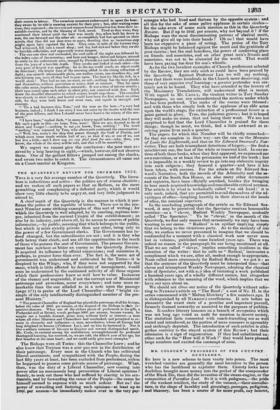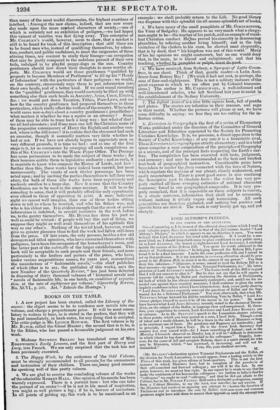MR. COLBURN'S PEDIGREES OF THE COUNTRY GENTLEMEN.
So here is a new scheme to turn vanity into pence. The most *retched vanities are generally the _most lucrative to the person who has the hardihood to e:tploiter 'them. Carroty locks have doubtless brought more money into the pocket of the compounder of the Black Die, than did the invention of the steam-engine, or the composition of Paradise Lost. So it is with pedigrees,—the Mide of the weakest intellect, the study of the vainest—their manure& ture, in the shape of heraldry and genealogy, peerages, pedigieet. Mid blazonry,- -has been a source of far momprofit, nay hOnotir, than many of the most useful diseoveries, the highest exertions of intellect. ;Amongst the new claims, indeed, that are now every day made 'upon the more marked characters of society,—one of which is certainly not an exhibition of pedigree,—we had hoped this vainest of vanities was fast dying away. This enterprise of Mr. COLBURN'S would, however, seem to show, that a market is still to be found for trash of this description; that still there are to be found men who, instead of qualifying themselves, by educa- tion, conduct, and public usefulness, to meet the exigencies of these stirring times, are content to study their lineage—an occupation that may be justly compared to the sedulous pursuit of their own tail's, indulged in by playful puppy-dogs in the sun. Country gentlemen should now direct their thoughts to more worthy ob- jects. Mr. COLBURN would set those gentlemen "qualified by property to become Members of Parliament" to fill up his "Heads of Information" with the particulars of their pedigrees : we would, on the contrary, strenuously urge them to put ,information into their own heads, and of a better kind. If we serit round circular to the "qualified" gentlemen, they would certainly be filled up wit something else than such heads as Ancestry, Arms, Crest, Estates we Would put down Taxation, Tithes, Poor-Laws, and see bow far the country gentlemen had prepared themselves in these particulars, which really affect the welfare of the country. Who in the -world cares now-a-days about a country gentleman's grandfather? what matters it whether he was a squire or an attorney ? Some of them may be able to trace back a long way : but what of that ? we all had ancestors; and if one man can tell the Christian name of the progenitor cotemporary of Harry the Eighth and another can- not, where is the difference? it is certain that the obscurest had such an ancestor, though' it assuredly matters very little whether he had or not. If we have not already begun to appreciate men on very different grounds, it is time we had : and as one of the first steps to it, let us commence by sweeping all such compilations as this of Mr. COLBURN'S into the Waste Paper Office. The Peerage has some pretensions to be made the subject of these works: for their honours entitle them to legislative authority ; and as such, it is requisite to know who compose the House of Lords, and how: further than this, these works have indeed been carried, but most unnecessarily. The vanity of each titular personage has been acted upon; and by inciting the parties themselves to tell their own story, the bulk of these idle works have been capriciously and uselessly swollen to a huge size. Now it seems that the Country Gentlemen are to be used in the same manner. It will be so far consoling to some, that it will probably afford the only opportunity ever offered to them of appearing in print. A more ludicrous sight we cannot well imagine, than one of these bodies sitting down to tell us whom he married, and who his father was, mid who is his 'eldest son. It is evident enough that the stook of public information is indebted, in sevefal instances in the work before us, to the gentry themselves. Mr. BURKE has done his part as well as could be wished: if people will buy this sort of thing, we suppose they might as well avail themselves of his aptitude this way as any other's. Nothing of the trivial kind, however, would give us greater pleasure than to find the work had fallen still-born from the press. Of late years, the only persons, besides a few old dowagers and titled spinsters, who have concerned themselves with pedigrees, have been the occupants of the housekeeper's room, and the better iart of the valetuille of the larger establishment. This book will be acceptable to such people and their friends, and more particularly to the butlers and porters of the press, who have, under various supposititious names, for years past, monopolized the Manufacture of " fashionable novels,"—the chief publisher of which (that is to say, the publisher of this work), says the new Number of the Quarterly Review," has just been detected in disposing of thirty thousand volumes of historical novels' and 'novels of fashionable life,' in one batch, on condition of eaporta- lion, at the rate of eightpence per volume." (Quarterly Review, No. XCVL, p. 391. Art. " Zohrab the Hostage.")























 Previous page
Previous page